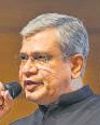Essayer OR - Gratuit
The Emergency and politics of the body
Hindustan Times Bengaluru
|June 24, 2025
For the average Indian, it was through the tyranny of the dreaded nasbandi (sterilisation) camps that the worst consequences of the suspension of civil and political rights under the Emergency manifested itself in their everyday lives.
In September 1976, India recorded over 1.7 million sterilisations, a figure that equalled the annual average for the 10 preceding years. By 1977, Sanjay Gandhi, the younger son of then Prime Minister Indira Gandhi, and his bulldozer gang had overseen the conduct of more than 8 million sterilisations. The predominance accorded to forced sterilisation was intertwined with Sanjay Gandhi's growing influence. He needed to consolidate his hold on power within the Congress; family planning (and his other obsession, urban gentrification) became his preferred tools.
In the process, he unleashed the worst form of State violence, stripping ordinary citizens of agency over their bodies. Much has changed in India's approach to family planning since those dark Emergency years. However, 50 years on, Sanjay Gandhi's weaponisation of family planning and exertion of power over individual bodily rights afford important lessons for how we respond to demographic challenges in the contemporary moment. Above all, it serves as a critical reminder to be patient with democracy, for it is the only pathway for sustainable, socially just economic growth and development.
On the surface, Sanjay Gandhi's approach to family planning was not new. Malthusian worries had shadowed India's demographic debates long before independence, and India became the first country in the world to launch a national family planning programme in 1952. And as Christophe Jaffrelot and Pratinav Anil argue in India's First Dictatorship: The Emergency, 1975-77, elements of eugenics, visible in the Emergency, undergirded these debates. "Undesirable others"—minorities and lower castes—were the targets.
Cette histoire est tirée de l'édition June 24, 2025 de Hindustan Times Bengaluru.
Abonnez-vous à Magzter GOLD pour accéder à des milliers d'histoires premium sélectionnées et à plus de 9 000 magazines et journaux.
Déjà abonné ? Se connecter
PLUS D'HISTOIRES DE Hindustan Times Bengaluru
Hindustan Times Bengaluru
SKIPPER BAVUMA RETURNS FOR SOUTH AFRICA'S TWO-TEST SERIES AGAINST INDIA
Temba Bavuma ‘was on Monday namedas captain of South Africa’s squad for two World Test Championship matches in India next month having recovered from injury.
1 min
October 28, 2025
Hindustan Times Bengaluru
A Coldplay warm-up for Sophie Turner?
It seems love may be striking a new chord in the West. Game of Thrones star Sophie Turner and Coldplay frontman Chris Martin have reportedly started dating after both endured highly publicised breakups earlier this year.
1 min
October 28, 2025

Hindustan Times Bengaluru
Tanvi’s World Juniors high kindles the Saina-Sindhu successor talk
Who after Saina Nehwal and PV Sindhu? The question had hovered over Indian badminton for around a decade, with no expert able to provide an answer.
3 mins
October 28, 2025

Hindustan Times Bengaluru
Govt approves ₹5,532 cr projects under ECMS
The Union government on Monday approved the first batch of projects under the Electronics Components Manufacturing Scheme (ECMS), with seven proposals cleared involving a total investment of ₹5,532 crore, with an expected production output of ₹44,406 crore and the creation of more than 5,100 direct jobs.
2 mins
October 28, 2025
Hindustan Times Bengaluru
SC seeks states’ data on cases of ‘digital arrest’
The Supreme Court ‘on Monday sought details of cyber crimes involving “digital arrest” pending investigation before all states and union territories as it considered a larger probe by one agency, preferably the Central Bureau of Investigation (CBI), to examine all cases.
2 mins
October 28, 2025
Hindustan Times Bengaluru
Jaishankar flags energy trade constraints, unstable markets
India's growing concerns about constriction of energy trade, market access and supply chain reliability were highlighted by external affairs minister S Jaishankar at the East Asia Summit in Malaysia on Monday, against the backdrop of strains created by geopolitical disputes, tariffs and trade sanctions.
2 mins
October 28, 2025
Hindustan Times Bengaluru
Top court upholds HC order to resume MGNREGA in Bengal
The Supreme Court ‘on Monday upheld a Calcutta high court order directing the Centre to resume the employment guarantee scheme of MGNREGA in West Bengal
2 mins
October 28, 2025
Hindustan Times Bengaluru
SC SLAMS MAHA GOVT OVER POOR COMPENSATORY AFFORESTATION
The Supreme Court on Monday slammed the Maharashtra government over the compensatory afforestation carried out in lieu of trees cut in Aarey forest after an inspection of the over 20,000 saplings revealed that only 50% of trees had managed to survive.
1 min
October 28, 2025
Hindustan Times Bengaluru
Bengal transfers 527 bureaucrats ahead of SIR rollout, row erupts
In one of its largest administrative rejigs, the West Bengal government on Monday transferred 527 Indian Administrative Service (IAS) and West Bengal Civil Service (WBCS) officials ahead of the rollout of the special intensive revision (SIR) of electoral rolls in the state.
1 min
October 28, 2025
Hindustan Times Bengaluru
Cultural motifs shape parties’ electoral plans
Culture becomes poll pitch
4 mins
October 28, 2025
Listen
Translate
Change font size

